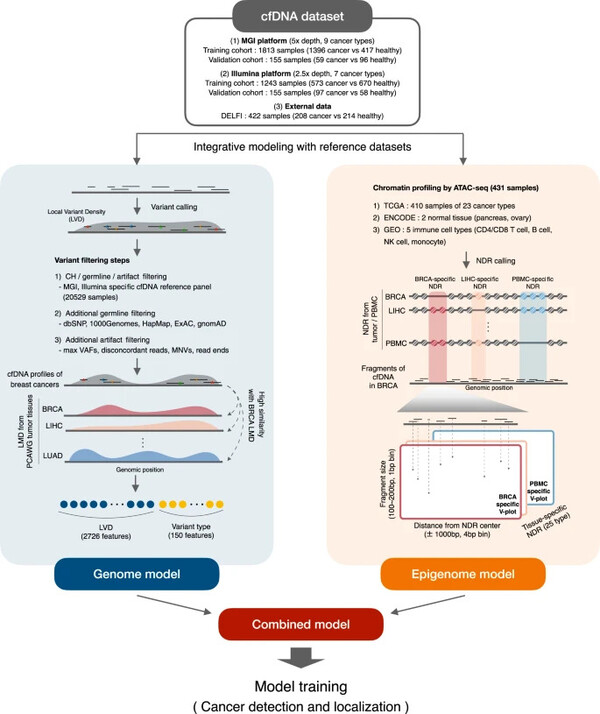GC Genome said on Thursday that its researchers have developed an algorithm that can specifically detect multiple types of cancers with higher sensitivity using liquid biopsy samples.

The newly developed AI model significantly enhances the rate of cancer diagnosis through blood compared to existing liquid biopsy technology.
The algorithm combines data from the "Genome Model" that utilizes genomic mutation information obtained from cell-free DNA and the "Epigenome Model" that predicts whether a gene is expressed or not.
Cho Eun-hae, director of the genomic research center at GC Genome, said the company has been collaborating with top hospitals in Korea for many years to conduct large-scale whole genome analysis of cancer patients' blood.
Under the leadership of Professor Choi Jung-kyoon from KAIST's Department of Bioengineering, the research team performed whole genome sequencing (WGS) on 2,000 patients with nine different types of cancer to develop a cancer detection model. The team also utilized data from over 20,000 healthy individuals to help remove noise from the datasets.
Afterwards, the algorithm's performance was evaluated using various DNA sequencing instruments from Illumina and MGI. It was also applied to datasets from different ethnicities, including Koreans and Caucasians.
The researchers discovered that the new algorithm outperformed previous algorithms, especially in detecting stage 1 cancer, with a sensitivity of 91.1 percent and a cancer type prediction rate of 81.7 percent when it was applied to 1,241 normal control samples and 2,543 cancer patients.
"We are pleased to announce our excellent AI-based early cancer detection algorithm technology," said GC Genome’s CEO Ki Chang-seok. "We will continue our research to develop diagnostic technologies with higher accuracy and sensitivity by utilizing various AI-based algorithms."
The study was recently published in Nature Communications on April 10.
Related articles
- Proteogenomic data show new therapeutic targets for intractable bile duct cancer
- Does lack of sleep cause cancer to recur or metastasize?
- BMS and Novartis’ myeloid leukemia treatments one step closer to being insured in Korea
- NGeneBio expands NGS-breast cancer diagnostic to Thailand
- Vaxcell-Bio's liver cancer NK therapy granted compassionate use approval
- KAIST scientists use CRISPR to develop TCR-T immunotherapy for solid cancers
- GC Genome passes technical evaluation, prepares for Kosdaq IPO

